The hevc iptv encoder is key in broadcasting and streaming. It makes high-quality video possible at lower bitrates. This is changing how we watch live streams.
In 2025, the role of hevc iptv encoder will grow. It makes streaming better by using less bandwidth. This is great for live streams, where quality matters a lot.
Key Takeaways
- The hevc iptv encoder is a crucial component in the broadcasting and streaming industries.
- It delivers high-quality video at lower bitrates, making it ideal for live streaming.
- The hevc iptv encoder is revolutionizing the way we experience live streaming.
- It provides a more efficient and effective way to deliver video content.
- The hevc iptv encoder is enabling streaming services to offer higher quality video to their users.
- It reduces the strain on networks, making it essential for live streaming.
- The hevc iptv encoder is set to play a key role in unlocking high-quality streaming in 2025.
Understanding HEVC IPTV Encoding Technology
HEVC IPTV encoding technology is key for modern streaming. It lets us stream high-quality videos using less bandwidth. The whitepaper on IPTV and Cable shows how software-based encoding is faster and more scalable. The hevc iptv encoder is crucial for making video content streamable.
Comparing h.264 vs h.265 shows h.265 is better at compressing video. This is great for streaming services because it saves bandwidth. iptvtrends.net says features like high-definition and low latency are important for quality video.
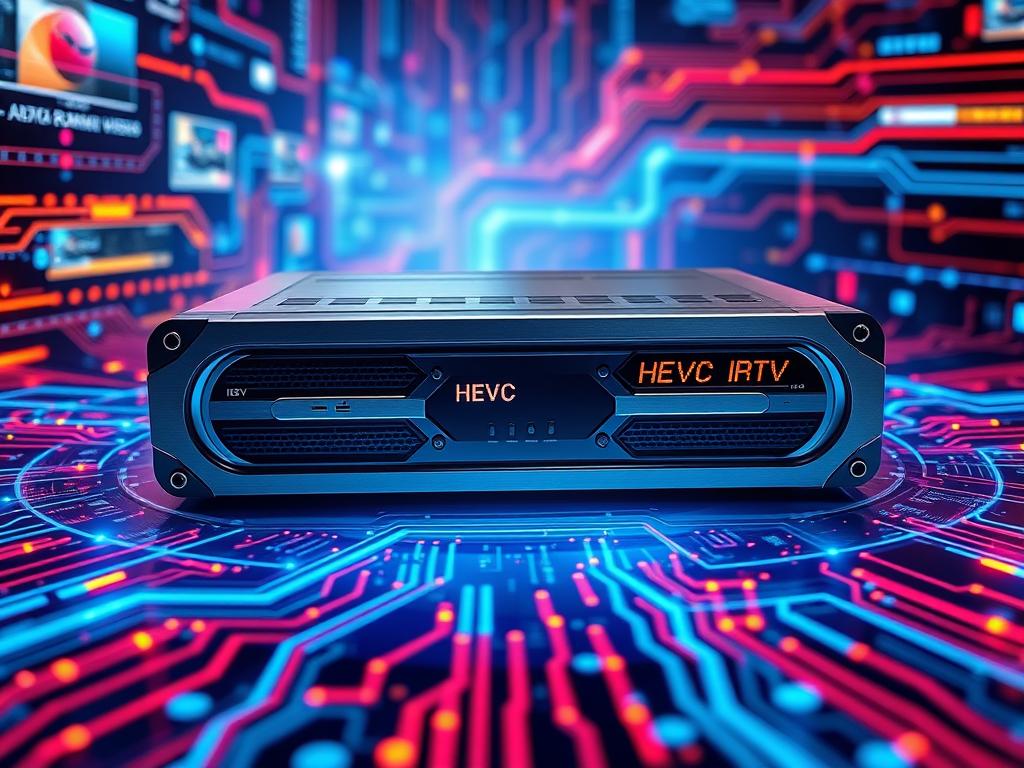
What is HEVC Encoding?
HEVC encoding, or H.265, is a new video compression standard. It’s more efficient and uses less bandwidth than H.264. It’s used a lot in IPTV and streaming services for high-quality video.
Key Benefits of HEVC Technology
HEVC technology has many benefits. It’s more efficient at compressing video and uses less bandwidth. These advantages make HEVC great for streaming services, allowing them to offer high-quality videos without overloading their networks.
Evolution from Previous Standards
HEVC has made a big leap from previous standards like H.264. It offers better compression and uses less bandwidth. This means streaming services can provide high-quality videos quickly, making HEVC essential for modern streaming.
The Revolutionary Impact of HEVC IPTV Encoder Solutions
The introduction of live streaming encoder technology has changed the game for broadcasting and streaming. It allows for high-quality video at lower bitrates. This is thanks to hevc iptv encoder solutions, making live streaming more popular. Now, viewers enjoy better video quality and less delay.
Using hevc iptv encoder solutions brings many benefits. Here are a few:
- High-quality video streaming at lower bitrates
- Reduced latency for a more responsive viewing experience
- Improved compression efficiency for better video quality
The need for live streaming encoder technology keeps growing. Hevc iptv encoder solutions are key in delivering high-quality content at lower bitrates. They are crucial for the streaming industry’s future.
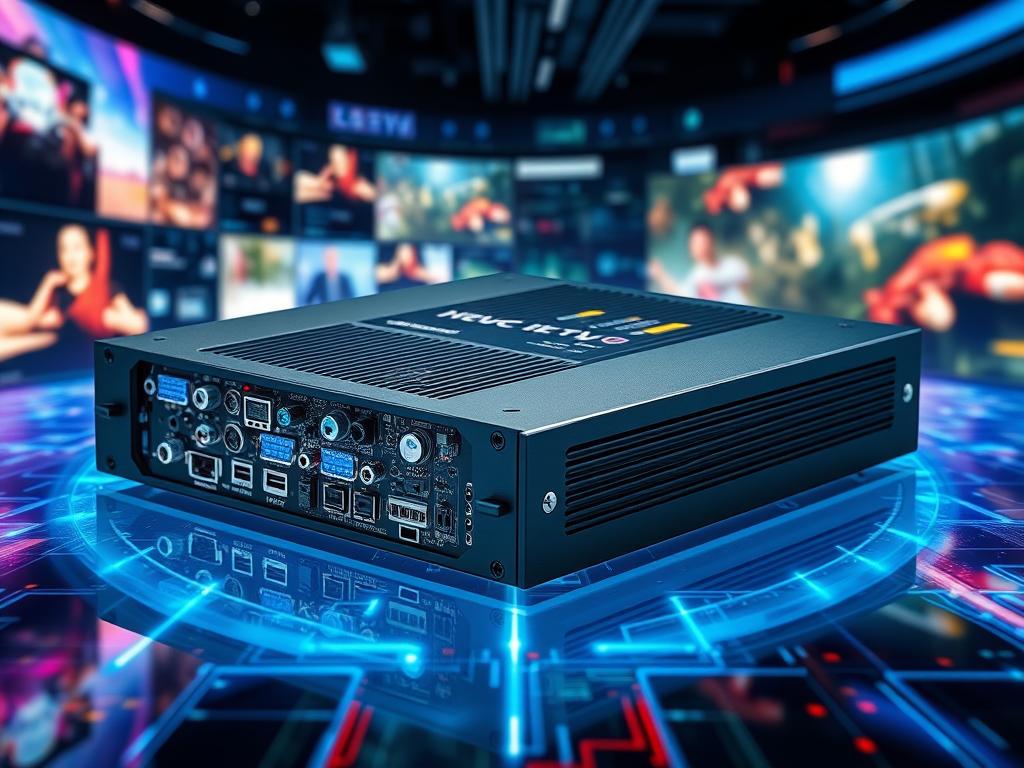
Core Features of Modern HEVC IPTV Encoders
Modern HEVC IPTV encoders are key for delivering top-notch video content. They offer efficient compression, manage bitrates, and control video quality. The hevc iptv encoder is vital for live streaming, making it possible to send high-definition videos to many devices.
These encoders use advanced algorithms to compress videos without losing quality. This is crucial for live streaming encoder apps, where a smooth and clear video stream is vital. Some main features of these encoders include:
- Compression efficiency: reducing the bitrate of the video stream while maintaining its quality
- Bitrate management: controlling the bitrate of the video stream to ensure a stable and high-quality delivery
- Quality control systems: monitoring and adjusting the video stream to ensure it meets the required standards
These features help deliver high-quality video content. This makes modern HEVC IPTV encoders a must-have for live streaming. By using a hevc iptv encoder, content providers can ensure their videos are delivered well, giving viewers a great experience.
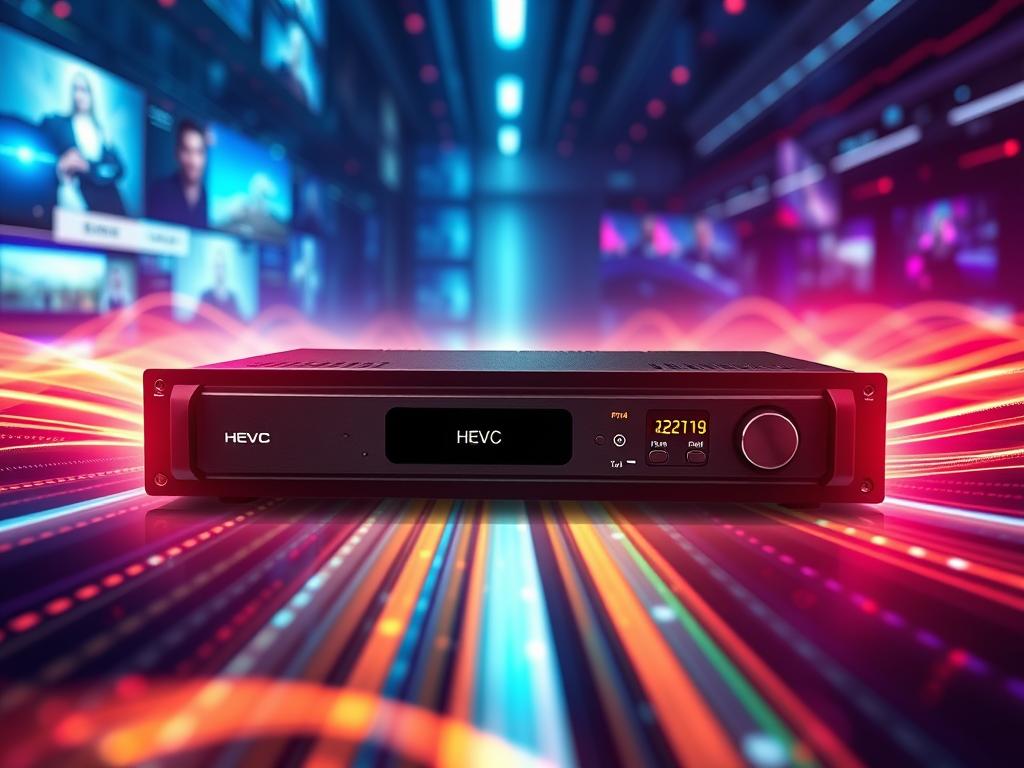
The need for high-quality video content is growing. So, the role of modern HEVC IPTV encoders is more important than ever. As technology gets better, we’ll see even more advanced features in these encoders. This will improve how live streaming content is delivered.
H.264 vs H.265: A Comprehensive Comparison
Video encoding is a big deal, and h.264 and h.265 are at the forefront. The hevc iptv encoder plays a crucial role in compressing and sending out top-notch video. Let’s dive into the differences between h.264 and h.265 and how they affect video streaming quality and efficiency.
H.265, or HEVC, is way better at compressing video than h.264. This means it needs less bandwidth to stream high-quality videos. This makes h.265 a top pick for streaming high-quality video content. Here are some key differences between the two standards:
- Compression efficiency: h.265 offers up to 50% better compression than h.264
- Bitrate requirements: h.265 requires lower bitrate for the same video quality
- Video quality: h.265 supports higher resolutions and frame rates than h.265
The following table summarizes the key differences between h.264 and h.265:
| Feature | H.264 | H.265 |
|---|---|---|
| Compression efficiency | Up to 30% better than MPEG-4 | Up to 50% better than h.264 |
| Bitrate requirements | Higher bitrate required for high-quality video | Lower bitrate required for high-quality video |
| Video quality | Supports up to 4K resolution | Supports up to 8K resolution |
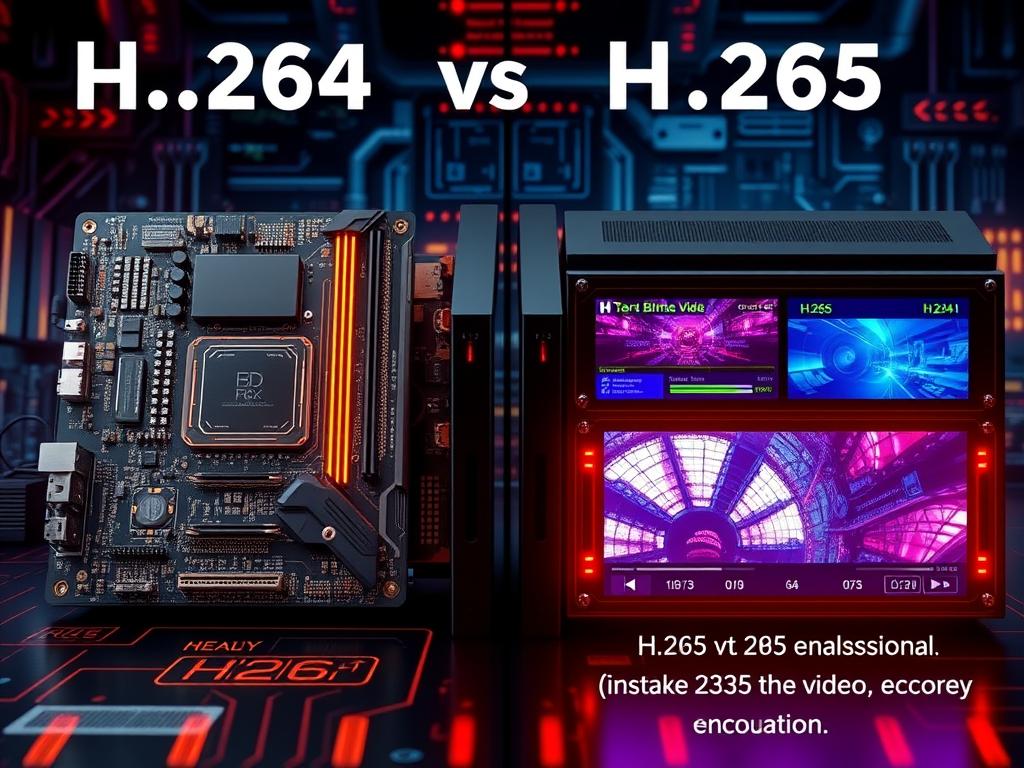
Implementing HEVC IPTV Encoder Systems
Setting up an HEVC IPTV encoder system for live streaming needs careful thought. A live streaming encoder is key for compressing and sending high-quality video. It’s important to look at hardware, software, and network needs for a smooth streaming experience.
Here are the main steps to set up an HEVC IPTV encoder system:
- Check if the hardware, like processing power and memory, can handle HEVC encoding.
- Set up the software to get the best encoding settings for your needs.
- Look at the network, including bandwidth and latency, to ensure a stable connection.
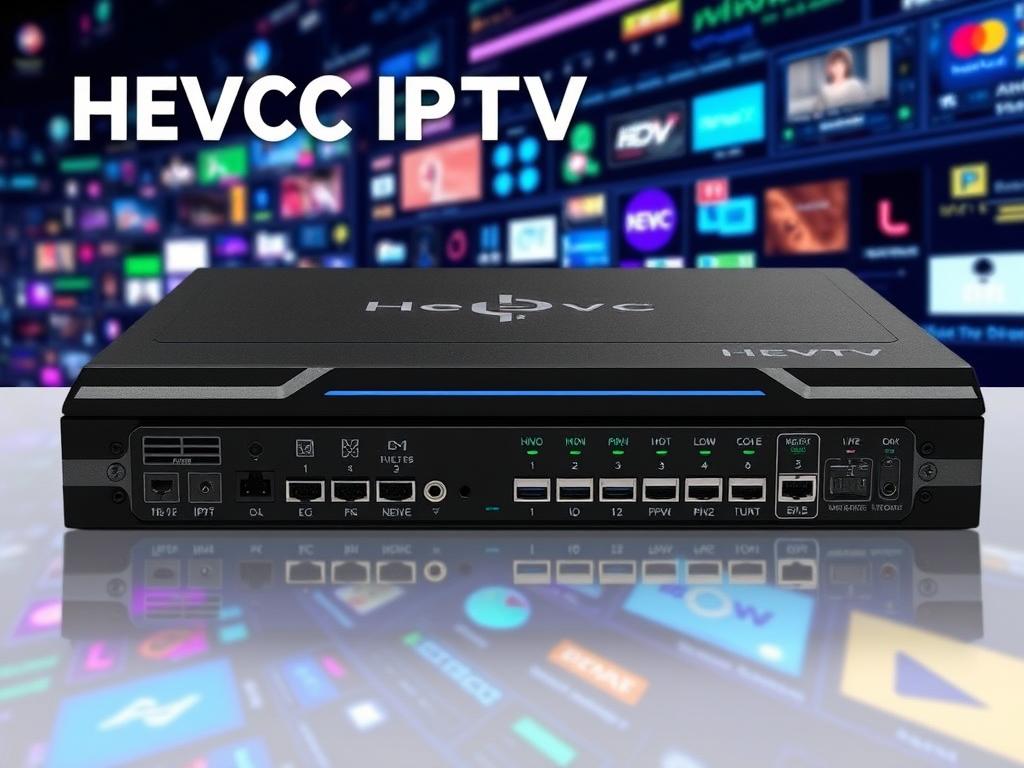
A good HEVC IPTV encoder system boosts live streaming quality and efficiency. It uses the HEVC codec’s advanced compression and a live streaming encoder‘s flexibility. This way, content providers can send high-quality video to many devices and platforms. It’s great for broadcasting, enterprise, and more, making streaming better for everyone.
| Component | Description |
|---|---|
| Hardware | Processing power, memory, and storage requirements |
| Software | Encoding settings, compression algorithms, and streaming protocols |
| Network | Bandwidth, latency, and connectivity requirements |
Optimizing Stream Quality with HEVC Technology
The hevc iptv encoder is key for streaming top-notch video. It uses HEVC tech to improve video quality and cut down on bandwidth. Knowing the difference between h.264 vs h.265 is important for better stream quality.
Several things affect stream quality, including:
- Bitrate management: Adjusting the bitrate to balance video quality and bandwidth usage.
- Resolution and frame rate: Selecting the optimal resolution and frame rate for the target audience and device.
- Quality control systems: Implementing robust quality control systems to ensure consistent video quality.
Streamers can improve video quality by considering these factors and using the hevc iptv encoder. This way, they can meet their audience’s expectations without breaking the bank on bandwidth and infrastructure. Choosing between h.264 vs h.265 is also crucial for the right streaming strategy.
Cost-Benefit Analysis of HEVC Implementation
Thinking about using an hevc iptv encoder? It’s key to look at the costs and benefits. You need to check the upfront costs, the expected return on investment (ROI), and the ongoing expenses. An hevc iptv encoder can cut down on bandwidth costs and boost stream quality. This makes it a good choice for live streaming.
A live streaming encoder can also make your streaming setup more efficient and cheaper. Important things to think about include:
- The cost of the hevc iptv encoder hardware and software at first
- The long-term ROI based on lower bandwidth costs and better stream quality
- The ongoing costs, like maintenance and support
By looking at these points, businesses can decide wisely about using an hevc iptv encoder. This can help them save money and improve their streaming services.
In summary, the benefits of using an hevc iptv encoder and live streaming encoder are clear. They offer more value than the costs. This makes it a smart choice for companies wanting to better their streaming setup.
Best Practices for HEVC IPTV Streaming
When using hevc iptv encoder solutions, remember these best practices. They help improve your streaming experience. Here are some tips to keep in mind:
Choosing between h.264 vs h.265 compression standards is key. H.264 is widely used, but h.265 offers better quality and compression.
- Choose a high-quality hevc iptv encoder for efficient compression and low latency.
- Manage your bitrate well to balance quality and bandwidth use.
- Use quality control systems to monitor and adjust your stream in real-time.
By following these tips and using hevc iptv encoder solutions, you can provide high-quality, low-latency streams. This makes the most of the h.264 vs h.265 debate.
Common Challenges and Solutions in HEVC Encoding
Using an hevc iptv encoder for live streaming can face several challenges. One big issue is managing bandwidth, which can cause buffering and poor quality. To fix this, it’s key to tweak the encoder settings and keep your internet stable. For more on solving buffering problems, check out the iptv trends website.
Another hurdle is making sure your stream works on all devices and platforms. To beat this, pick a live streaming encoder that handles many formats and resolutions. Performance optimization is also crucial for smooth encoding. This means keeping your encoder software up-to-date and watching your system’s resources.
- Check the encoder settings and adjust as needed
- Monitor system resources and update software regularly
- Ensure a stable internet connection and optimize bandwidth management
By tackling these issues and following best practices, you can make your hevc iptv encoder and live streaming encoder work better. This leads to high-quality and reliable streaming for everyone.
Future-Proofing Your Streaming Infrastructure
The need for high-quality streaming is on the rise. To keep up, adopting hevc iptv encoder technology is key. It beats traditional h.264 in compression efficiency. Switching to hevc iptv encoder ensures your setup can handle the growing demand for top-notch video.
When comparing h.264 vs h.265, h.265 wins with better compression and support for higher resolutions. To future-proof your setup, consider these steps:
- Check your current setup and find areas to upgrade
- Invest in hevc iptv encoder for better compression
- Make sure your setup can grow with demand
By following these steps, your streaming infrastructure will be ready for the future. It will deliver high-quality video to your viewers.
| Encoding Technology | Compression Efficiency | Resolution Support |
|---|---|---|
| H.264 | Medium | Up to 4K |
| H.265 (HEVC) | High | Up to 8K |
Real-World Applications and Success Stories
The hevc iptv encoder is used in many fields, like broadcasting and business. It offers top-notch video streaming and cuts down on bandwidth. This makes it a great choice for companies wanting to share live content. For example, a live streaming encoder helps broadcast sports, concerts, and more to people all over the world.
Broadcasting Industry Cases
In broadcasting, the hevc iptv encoder streams live events like sports and news. Its benefits include:
- High-quality video streaming
- Less bandwidth needed
- A cost-effective option
Enterprise Implementation Examples
In business, the hevc iptv encoder is used for video meetings, training, and more. Big names like Amazon and Google use it to stream live content to their teams and customers. This technology helps them save on bandwidth while keeping video quality high.
The hevc iptv encoder has changed how companies stream live content. It offers high-quality video and saves bandwidth, making it key for broadcasting and business. As live streaming grows, so will the use of hevc iptv encoders. This will help companies share live content efficiently and affordably.
Market Trends and Future Developments
The hevc iptv encoder market is growing fast. This is because more people want high-quality video streaming. New technologies like 5G and artificial intelligence are also coming. The debate between h.264 vs h.265 is heating up, with many thinking h.265 will soon be the standard.
Some key trends for hevc iptv encoder technology include:
- Cloud-based encoding solutions are becoming more popular.
- There’s a big demand for 4K and 8K video streaming.
- Artificial intelligence and machine learning are being integrated.
- 5G networks are expanding and changing video streaming.
As the market grows, keeping up with new trends is crucial. The future of hevc iptv encoder technology looks bright. It could be used in many fields, like broadcasting, entertainment, and education.
The table below shows the main differences between h.264 and h.265 encoding:
| Feature | H.264 | H.265 |
|---|---|---|
| Compression Efficiency | Up to 50% more efficient than MPEG-4 | Up to 50% more efficient than H.264 |
| Bitrate | Lower bitrate requirements | Even lower bitrate requirements |
| Quality | High-quality video streaming | Even higher-quality video streaming |
In conclusion, the hevc iptv encoder market is set for big growth. This is due to the need for better video streaming and new technologies. It’s important to keep up with the latest trends and developments in this field.
Conclusion
The HEVC IPTV encoder is changing the streaming world. It offers top-notch compression and bitrate control. This means better viewing for everyone and lower costs for providers.
Whether you’re a big broadcaster or a small streaming service, HEVC IPTV encoders are a smart choice. They make sure your streaming stays top-notch and future-proof. Your viewers will love the best live streaming experience.
The need for HEVC IPTV encoding will keep growing. By using this tech, you can lead in the high-quality streaming field. The future is now, and HEVC IPTV encoders unlock it.
FAQ
What is HEVC Encoding?
HEVC, or High-Efficiency Video Coding, is a new video compression standard. It offers better compression than H.264. This means you can get high-quality video at lower bitrates, which is great for streaming and broadcasting.
What are the key benefits of HEVC technology?
HEVC has many benefits. It can compress video up to 50% better than H.264. This means you need less bandwidth and storage. It also lets you stream high-quality 4K and 8K videos at lower bitrates.
How does HEVC technology evolve from previous standards?
HEVC is the next step after H.264. It uses new techniques to improve compression. This results in better video quality at lower bitrates. It’s a big leap forward in video technology.
What are the compression efficiency and bitrate management features of modern HEVC IPTV encoders?
Modern HEVC IPTV encoders are very efficient. They use advanced algorithms to compress video up to 50% better than H.264. They also manage bitrates well, ensuring quality video streaming.
How do H.264 and H.265 (HEVC) compare in terms of compression efficiency and video quality?
H.265 (HEVC) is way better than H.264. It can compress video up to 50% better. This means you get better video quality at lower bitrates. It’s perfect for streaming and live broadcasting.
What are the hardware requirements and software configuration considerations for implementing HEVC IPTV encoder systems?
Setting up HEVC IPTV encoders needs careful planning. You need powerful hardware and the right software. The software must be set up correctly for the best performance and video quality.
What are the common challenges and solutions in HEVC encoding?
HEVC encoding can face challenges like bandwidth management. Solutions include using adaptive bitrate streaming and optimizing networks. It also helps to optimize encoder performance.
How can HEVC IPTV encoder technology help future-proof your streaming infrastructure?
HEVC IPTV encoders are key to future-proofing your streaming. They offer better compression and quality. This prepares your infrastructure for future video demands and emerging technologies.
What are some real-world applications and success stories of HEVC IPTV encoders?
HEVC IPTV encoders are used in many ways. They help major broadcasters deliver high-quality 4K and 8K content. They also improve video conferencing and live event streaming.
What are the current market trends and future developments in HEVC IPTV encoding?
The HEVC IPTV encoding market is growing fast. It’s becoming the new standard for video encoding. Future developments include 5G and AI, making video delivery even better.
